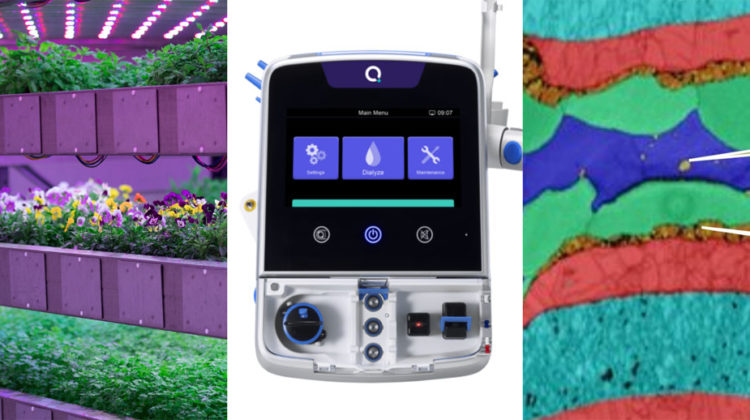
The Royal Academy of Engineering has announced the shortlist for the 2022 MacRobert Award, the UK’s longest-running and most prestigious award for UK engineering innovation.
According to the RAE, the three finalists represent strikingly different aspects of engineering and are recognised for a combination of technical innovation and commercial and societal impact.
Selected by a judging panel made up of nine esteemed engineering experts, the 2022 finalists are Intelligent Growth Solutions, Oxford Instruments and Quanta Dialysis Technologies.
Intelligent Growth Solutions was recognised for its vertical farming technology, which blends engineering, crop science and agronomy expertise. The system houses ‘towers’ of crops within an enclosed structure that controls all aspects of the growing environment – light, temperature, humidity, irrigation, nutrition and even air consumption – while ensuring no water wastage at any point in the cycle. The level of control provided by this innovation supports farmers by de-risking the early stages of crop cultivation, while also supporting plant diversification through high-density, high-value indoor crop production. The technology also has the potential to support reforestation through germination and early growth of tree saplings.
Oxford Instruments was recognised for developing the Symmetry detector, which integrates with scanning electron microscopes and dramatically increases the speed, sensitivity and resolution of analysis that is possible. Symmetry enables a deeper understanding of a material’s structure down to the nanoscale-level, allowing minuscule weaknesses or flaws in various materials to be identified and addressed. This opens up vast industrial and scientific opportunities – from developing far more robust and long-lasting batteries and semiconductors, to stronger aircraft turbine blades. Symmetry has turned what was a niche technology predominantly used in research labs into a more widely accessible process with applications across a variety of sectors and industries.
Quanta Dialysis Technologies was recognised for creating a compact and portable dialysis machine, allowing more flexible and accessible care for patients with renal failure. Originally developed to reconstitute orange juice from concentrate, Quanta’s innovative disposable fluid cartridge system was repurposed for use in a compact haemodialysis machine. Simpler to operate, yet as powerful as traditional dialysis machines, Quanta’s SC+ haemodialysis system was designed to bring dialysis directly to the patient, allowing patients to treat themselves at home, rather than spending hours each week at healthcare facilities. It marks the first major advance in dialysis technology in decades and is already used by several NHS Trusts.
‘Engineering has a key role to play in combating the greatest challenges of our time – from climate change to driving a sustainable healthcare system through the COVID-19 pandemic and into the future,’ said Professor Sir Richard Friend, chair of the judging panel. ‘The breadth of the 2022 MacRobert Award finalists shows exactly that, from innovative healthcare technology that has reduced the strain on the NHS to vertical farming with zero water waste and a step-change in electron microscopy that is revolutionising research and innovation across a variety of sectors.
‘The global impact these vibrant and creative innovations have already had on their respective sectors and society at large is cementing UK engineering’s leading role on the world stage,’ he continued. ‘It goes to show quite how far-reaching UK engineering now is, something that will only continue given the world-beating talent located right here in the UK.’
Founded by the MacRobert Trust and first presented in 1969, the MacRobert Award honours the winning organisation with a gold medal and the team members with a cash prize of £50,000. The winning team will be announced at the Royal Academy of Engineering Awards Dinner on 12 July.


